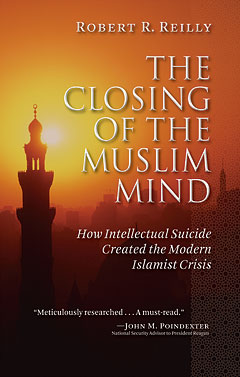As an immigrant from a Muslim majority nation, I see it as my mission to warn my fellow American citizens against the dangers of religious extremism; not just concerning the violence modern Islamism is most notorious for, but the intellectual harm, which, as it happens, can be much more nefarious and have everlasting effects. In fact, that is going to be my 2013 resolution. To help that, taking a step back and looking at some history is helpful.
As everyone knows, during the Dark Ages when Christian Europe barely made any scientific progress at all, it was the Islamic world that carried the torch of science, math, and art, our legacy from the pagan Greeks. Yet, at some point, the Islamic world turned its back on science. So, what happened?
While this is a complex question, the backwardness promoted by Islamic theologicians certainly played a crucial part. The pivotal moment in the fall of the Islamic world (discussed in the book above) was probably the writing of “the Incoherence of the Philosophers” by the influential 11th century author, Abu Hamed Al-Ghazali.
Who was Ghazali?
 We read in his Wikipedia article:
We read in his Wikipedia article:
His work… successfully changed the course of Islamic philosophy.. the early Islamic Neoplatonism, developed on the grounds of Hellenistic philosophy, for example, was so successfully refuted by al-Ghazali that it never recovered.
His 11th century book titled The Incoherence of the Philosophers marks a major turn in Islamic epistemology. The encounter with skepticism led al-Ghazali to embrace a form of theological occasionalism, or the belief that all causal events and interactions are not the product of material conjunctions but rather the immediate and present Will of God.
The Incoherence also marked a turning point in Islamic philosophy in its vehement rejections of Aristotle and Plato. The book took aim at the falasifa, a loosely defined group of Islamic philosophers from the 8th through the 11th centuries (most notable among them Avicenna and Al-Farabi) who drew intellectually upon the Ancient Greeks. Al-Ghazali bitterly denounced Aristotle, Socrates and other Greek writers as non-believers and labeled those who employed their methods and ideas as corrupters of the Islamic faith.
Here is an an actual writing of Ghazali:
…our opponent claims that the agent of the burning is the fire exclusively;’ this is a natural, not a voluntary agent, and cannot abstain from what is in its nature when it is brought into contact with a receptive substratum. This we deny, saying: The agent of the burning is God, through His creating the black in the cotton and the disconnexion of its parts, and it is God who made the cotton burn and made it ashes either through the intermediation of angels or without intermediation. For fire is a dead body which has no action, and what is the proof that it is the agent? Indeed, the philosophers have no other proof than the observation of the occurrence of the burning, when there is contact with fire, but observation proves only a simultaneity, not a causation, and, in reality, there is no other cause but God. [Emphasis added]
In other words, it is not the fire that burns the cotton, it is God. If you want to know what that sounds like in 21st century English, listen to this:
Or to this:
Of course, Ghazali did not go unchallenged. Other Muslim authors (including Avorroes) tried to counter his work by their own writings, but it was too little, too late. The damage was already done. The Islamic world never recovered from the harm done by Ghazali.
The question is, in the 21st century United States, will we allow the same history to happen? Will we listen to the National Academy of Sciences, or to the likes of Robertson and Fischer?
Only time will tell.

